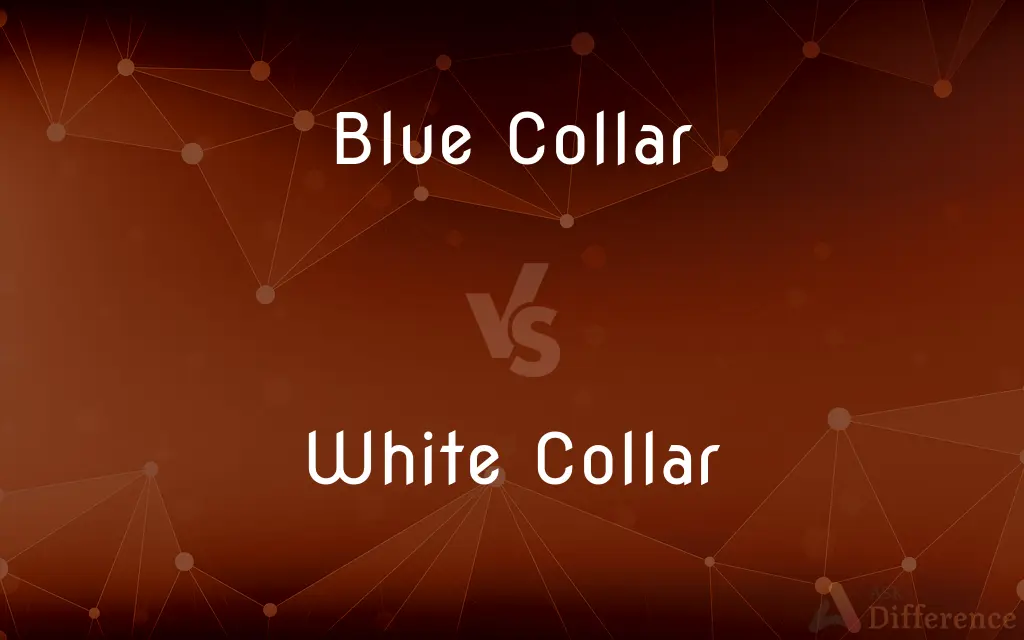Blue Collar vs. White Collar — What's the Difference?
By Tayyaba Rehman — Published on December 13, 2023
Blue Collar refers to manual labor jobs, often involving physical work; White Collar pertains to office-based, professional, or managerial jobs.

Difference Between Blue Collar and White Collar
Table of Contents
ADVERTISEMENT
Key Differences
Blue Collar jobs often involve manual labor and hands-on tasks, demanding physical exertion and skills. White Collar jobs, contrastingly, are typically situated in office environments and require mental or clerical skills over physical effort.
Blue Collar workers might be seen in industries like construction, manufacturing, and agriculture. White Collar professionals, on the other hand, are common in sectors such as finance, law, and administration.
Tools and attire differentiate them too; Blue Collar workers might wear uniforms and use heavy machinery, while White Collar employees often sport business attire and work with computers.
Historically, the term "Blue Collar" was derived from the blue uniforms worn by workers, whereas "White Collar" was coined due to the traditional white shirts worn by office workers.
Comparison Chart
Primary Nature
Manual, physical labor
Mental, clerical tasks
ADVERTISEMENT
Typical Setting
Factories, construction sites, farms
Offices, corporate settings
Common Industries
Construction, manufacturing, agriculture
Finance, law, administration
Tools/Attire
Machinery, tools, uniforms
Computers, business attire
Skill Set
Technical, trade skills
Analytical, administrative, managerial skills
Compare with Definitions
Blue Collar
Roles that may require technical or trade skills.
Welding is a specialized Blue Collar job.
White Collar
Typically requiring mental or analytical skills over physical effort.
Accountancy is a notable White Collar profession.
Blue Collar
Workers who might wear uniforms in their profession.
The factory's Blue Collar workers wore safety gear.
White Collar
Positions that may involve managerial or administrative responsibilities.
His White Collar role involved overseeing several departments.
Blue Collar
Common in industries such as agriculture and manufacturing.
The farming community primarily consisted of Blue Collar workers.
White Collar
Relating to office-based or professional tasks.
She aspired to have a White Collar job in a law firm.
Blue Collar
Pertaining to manual labor tasks.
He took a Blue Collar job in the construction industry.
White Collar
Often associated with corporate or administrative settings.
White Collar employees at the firm wore business suits.
Blue Collar
Often involving hands-on, physical work.
Blue Collar professions like plumbing require specific technical skills.
White Collar
Common in sectors such as banking, IT, and health.
The tech industry boasts many White Collar positions.
Blue Collar
Of or relating to wage earners, especially as a class, whose jobs are performed in work clothes and often involve manual labor.
White Collar
Of or relating to workers whose work usually does not involve manual labor and who are often expected to dress with a degree of formality.
Blue Collar
Working class; engaged or trained in essentially manual labor.
Blue-collar workers represent a diminishing segment of society.
White Collar
Of or pertaining to office work and workers; contrasted with blue-collar.
Blue Collar
Pertaining to the culture of blue-collar workers.
Even as a tenured professor, she remained proud of her blue-collar values.
White Collar
Pertaining to the culture of white-collar workers, as values, politics, etc.; contrasted with blue-collar.
Blue Collar
Of or designating work or workers in industry not requiring well-groomed appearance.
White Collar
Of or designating salaried professional or clerical work or workers;
The coal miner's son aspired to a white-collar occupation as a bookkeeper
Blue Collar
Of those who work for wages especially manual or industrial laborers.
Blue Collar
Of or designating manual industrial work or workers
Blue Collar
Of those who work for wages especially manual or industrial laborers;
Party of the propertyless proletariat
Common Curiosities
What's the primary distinction between Blue Collar and White Collar jobs?
Blue Collar refers to manual labor roles, while White Collar pertains to office-based or professional tasks.
Are Blue Collar jobs lesser in status than White Collar jobs?
Both have unique skill sets and challenges; neither is inherently lesser or greater in status.
Are all factory jobs considered Blue Collar?
Typically, yes, especially if they involve manual or physical labor.
Are White Collar jobs safer than Blue Collar ones?
Physical risks might be more evident in Blue Collar roles, but both can have their unique workplace challenges.
Can a White Collar worker transition to a Blue Collar role, and vice versa?
Absolutely, depending on the skill sets and training required for the specific job.
Do White Collar jobs always pay more than Blue Collar ones?
Not necessarily. Compensation varies by industry, region, skill level, and demand.
What attire is common for Blue Collar roles?
Often uniforms, safety gear, or specific attire suited for the work environment.
Why are they termed "Blue" and "White" Collar?
Historically, Blue Collar workers wore blue uniforms, while White Collar workers often wore white office shirts.
Can a job be both Blue Collar and White Collar?
Some roles might blur the lines, especially in modern settings, but traditionally the terms are distinct.
Are there educational requirements for Blue Collar jobs?
While some require specialized training or certifications, not all necessitate formal education.
Are tech jobs considered Blue Collar or White Collar?
Most tech jobs, especially in software or IT, are considered White Collar.
What's the growth potential in Blue Collar industries?
Growth potential varies by industry, but many Blue Collar sectors offer advancement opportunities.
Do White Collar jobs always require a college degree?
While many do, not all White Collar jobs mandate a college degree.
Are there more Blue Collar or White Collar jobs in the U.S.?
The distribution changes over time with economic shifts, but as of recent data, the U.S. has seen growth in both sectors.
Is the distinction between Blue Collar and White Collar still relevant today?
While the traditional distinctions exist, modern workplaces and roles can blur these lines.
Share Your Discovery

Previous Comparison
CD vs. Saving Account
Next Comparison
Mam vs. Ma’amAuthor Spotlight
Written by
Tayyaba RehmanTayyaba Rehman is a distinguished writer, currently serving as a primary contributor to askdifference.com. As a researcher in semantics and etymology, Tayyaba's passion for the complexity of languages and their distinctions has found a perfect home on the platform. Tayyaba delves into the intricacies of language, distinguishing between commonly confused words and phrases, thereby providing clarity for readers worldwide.












































